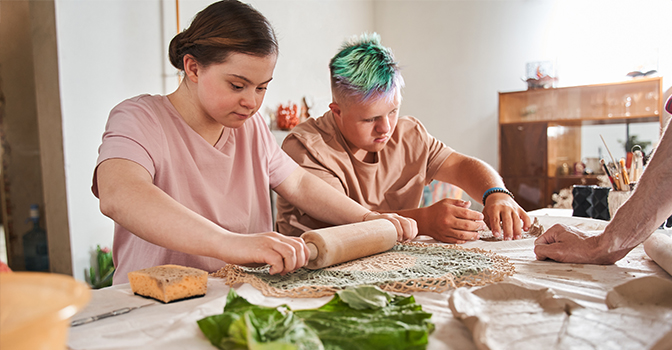Spending time doing things you enjoy, learning new skills and hanging out with friends is part of a healthy and balanced life.
If your disability makes it difficult to participate in these activities, the NDIS may be able to help.
Social and recreation support has always been a confusing area for NDIS funding. We explore what the NDIS means by social and recreational activities and the types of supports it may fund.
What are social and recreation activities?
Under the NDIS, the term “social and recreation” covers a wide range of things that you may do for fun, fitness, learning, relaxation or leisure.
Social and recreation activities include:
- Visiting friends and family
- Active hobbies such as bike riding or swimming
- Playing sports such as tennis, surfing or basketball
- Going out to movies or a show
- Going to places for fun such as an art gallery or shopping centre
- Relaxation such as yoga or meditation
- Classes to learn new skills such as woodwork, art, dance or craft.[1]
What social and recreation supports will the NDIS fund?
The NDIS will fund any extra help you need to participate in social and recreational activities because of your disability.
The NDIS may fund:
- Short term support to start a new sport, activity or hobby. For example, someone to help you choose suitable clothing and equipment, attend the first few sessions and help you build confidence to go yourself.
- Help to build skills so you can take part
- A support worker to help you participate if your disability means you can’t go alone
- Specialised equipment or modifications to help you join in
- Someone to take you to an activity if you can’t use public transport and it’s not reasonable for family or friends to take you
- Transport for adults with disabilities to get to and from social and recreational activities.
Top tip: You will need to pay any costs that everyone who participates has to pay. The NDIS will only fund any additional costs that you incur because of your disability.
The NDIS will not fund:
- Membership and joining fees
- Class fees
- Entry fees to movies, museums, galleries etc.
- Standard equipment
- Support to participate at elite or professional levels, or to compete in state, national or international competitions
- Activities for children where a parent is usually expected to attend
- Things funded by someone else such as a local club, community centre or sporting group.[2]
Transporting children to and from social activities is generally not covered by the NDIS but exceptions may apply for children with high support needs.
How to fund social and recreational supports.
To get funding in your NDIS Plan for social and recreational supports, you’ll need to have a related goal, such as joining a social group or taking a dance class.
Funding for social and recreational supports comes from your NDIS Core supports budget. You can use these funds flexibly to pay for social and recreational supports providing they’re reasonable and necessary for your needs and meet the NDIS criteria.
Ask yourself:
- Is it directly related to your disability?
- Is the item or support above and beyond what other people would have to pay?
- Is it likely to be beneficial to you?
- Is the activity helping you to pursue your goals?
- Is it legal and safe?
If you are unsure, check out some examples on the NDIS website.
Some people may also receive funding for assistive technology connected to attending social and recreational activities. This can be found under your Capital supports budget.
Prepared with information from the NDIS Social and Recreational Support Operational Guideline.
References:
[1] NDIS, What do we mean by Social and Recreation Support?, 2 December 2020.
[2] NDIS, Social and recreational support operational guideline, November 2020.

